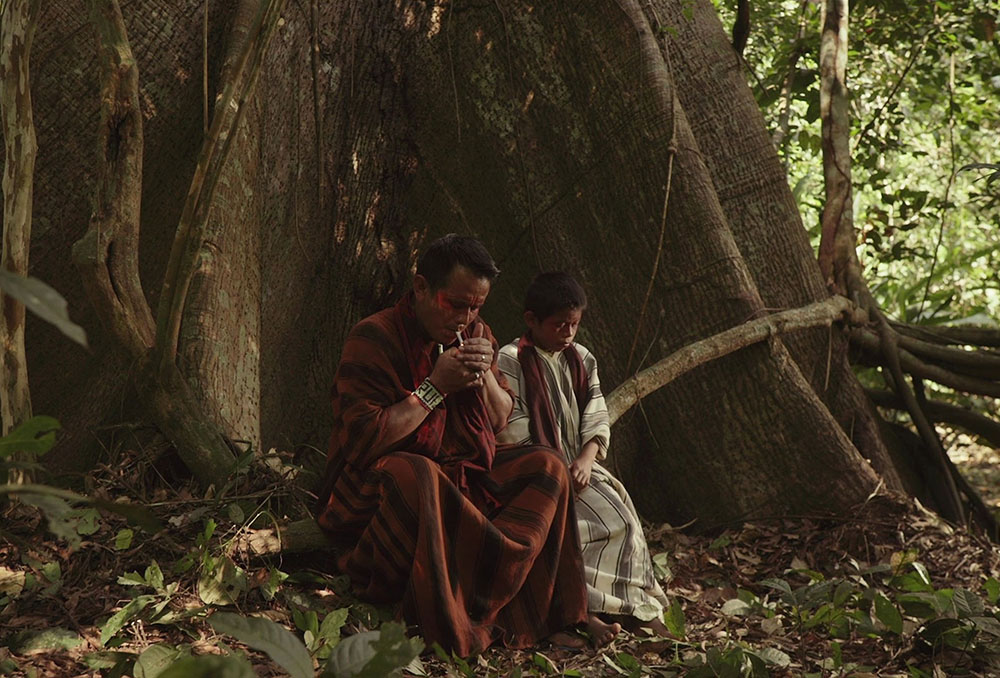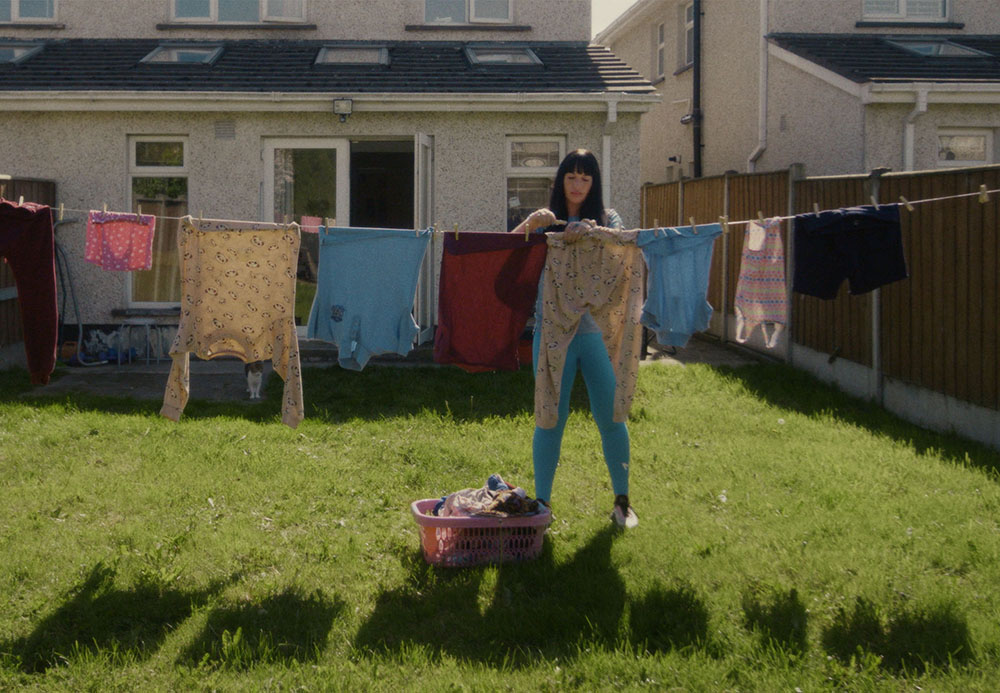There’s no surprise in saying that documentaries can offer insight into others’ lives, causes, or our planet — but sometimes these can come with an influx of information. Given that, I’ve found that the documentary short program often is an unsung treasure at film festivals. They’re not to be overlooked, as they offer insight — in a more digestible package — of relevant happenings and ideas in our world.
For instance, two films, “Plant Heist” and “The Box” — which I reviewed as part of 2021’s SXSW Film Festival — remain two of my favorite documentaries I’ve seen. Sundance Film Festival, which has just concluded, offered great full length docs (“Deep Rising” was my favorite, but fellow The Movie Buff critic Hector Gonzalez was fond of “The Disappearance of Shere Hite” and “King Coal”). So as we near our wrap-up of the festival, I want to highlight two films from Sundance’s ‘Documentary Short’ program, “Shriampari: Legacies of the River” and”Call Me Mommy.”
‘Shriampari: Legacies of the River’

The first documentary short in the program was “Shriampari: Legacies of the River” (“Shirampari: Herencias del río,” original title). This is one I didn’t know what to expect. However, what Director and Screenwriter Lucia Flórez does is to create an experience you can easily fall into. Flórez is a Fullbright Scholar from Peru, and has an MFA in Documentary Filmmaking from New York. Her passion for the project is evident, as this film is her screenwriting debut (although she served as Editor on the short “Rimana Wasi: Hogar de Historias” in 2022.
What works best about “Legacies of the River” lies in its invitational scope. While some documentaries try and approach (or highlight) themes or social issues, Flórez here simply invites us into to the life of an Ashéninka father and son, in one of the most remote places of the Peruvian Amazon. The father must teach his son, Ricky, their way of life for him to transition into adulthood. In this documentary, this is namely how to catch a catfish from the river. From later scenes we can see that catfish provide food and other forms of use for these people, and are an integral part of their way of life.
The method for catching the fish includes tying a rather large fishing hook to a stick by wrapping a large string around the hook and pole. The fishermen then dive into the river and try to hook the fish and pull it out using rope stretching off the pole. It certainly seems like it could be dangerous; but Flórez brings us into the endeavor as a coming-of-age experience for Ricky, and a necessity for the rest of the Ashéninka people.
But what I liked the most about “Legacies of the River” was the unchaperoned feel the film has by lacking narration, and the calm, still conversations father and son have throughout. I could imagine a busier documentary that needs to narrate and detail to us the importance of fishing to these central subjects, or their way of life. By allowing us to watch, and just listen, we are instead invited in warmly.
The camerawork by Diego Pérez is still and calm, especially toward later parts of the documentary that show father teaching son how to apply face paint. And what I was stricken with most of all was how much, despite the cultural divide between Ashéninka people and the U.S., where I write this, that the common bond of need, work, and rest can be understood by all. As Ricky’s father lights up a cigarette after a hard day, stating, “Now I’m going to smoke,” I couldn’t help but smile at this moment of earned peace.
“Shirampari: Legacies of the River” is a good doc. It teaches a lot in its short, 15-minute run-time, and is just honestly fun to watch. Its lack of narration invites you in, and basking in the calmness, encouragement, and stillness between father and son left me with a warm experience. One of my favorite experiences at Sundance; and against longer, bigger productions, that’s saying a lot.
Grade: A-
‘Call Me Mommy’

The second documentary short I watched was “Call Me Mommy,” Director Tara O’Callaghan’s foray into the exploration of the life of a middle-aged online sex worker who also happens to be a single mother. While this had the potential to be a racy subject, I didn’t feel it so. The film’s subject, Sinead Connell, is a down-to-earth woman living in Ireland, balancing online sex work with single motherhood. She has two daughters, one, a teenager, and the other six years old. And while O’Callaghan’s approach to the material is deferent and kind, I feel the doc bites off more than it can chew. We learn lots about Connell, her past, and some about the sex industry, but less about her daughters and her as a mother. An extra 10 minutes — or perhaps a full length documentary — could have remedied this.
You’ve got to hand it to Connell, however, for baring her soul for this documentary, and inviting audiences into a private world. There are some especially private scenes as Connell performs some sex acts for off-screen, online clients, dealing with nudity and masturbation, that lets you know what Connell deals with on a day-to-day basis. But the documentary also centers this with still scenes of Connell playing with her dogs outside, or taking a bath, enjoying a cigarette. Cinematographer Albert Hooi shoots the material unemotionally and with the deference afforded to the above-reviewed “Shirampari: Legacies of the River.” Yet something felt missing. And I think that something is its short run-time, its biggest fault.
What I appreciated about “Call Me Mommy” was two-fold. Firstly, it’s the subject material, and how O’Callaghan takes steps to demystify and destigmatize sex work. The second thing it does well is show Sinead Connell as a strong female who has endured a lot, but one who chooses this profession openly, and is not forced into it. Connell openly talks about how she enjoys the work, even though she has to compete with other, younger girls, who she claims have more attractive bodies than her. A trip to a sex shop for supplies lets us into these women’s lives, but the documentary does so without ever becoming ‘sexy.’ There’s no desire to make a porn film here, but to simply let us in to Connell’s life, and it does this with ease.
But what works less is that at 15 minutes, “Call Me Mommy” has to spend so much of its time detailing Connell’s trade, it has less to spend on her love of her children (which is evident), or explore how she balances both jobs. There’s also the fact that Connell details a traumatic experience she had with an ex-boyfriend (who beat her so badly he ended up with 3+ years in jail), and how leaving him was a difficult thing to do. O’Callaghan balances this with thoughts Connell has about her mother, who has passed away, who had bipolar disorder and suffered from alcoholism. But Connell narrates of her mother, as if an afterthought, that she helped her in her own way, even though she was sick. This level of understanding hints at a deep mother/daughter bond the documentary doesn’t have time to explore.
“Call Me Mommy” isn’t a bad documentary. It tries. Connell is extremely likable and relatable, and O’Callaghan lets us into her life nakedly, and without judgement. I wish the film had been a little longer, so we could see how Connell interacts with her children and get a sense of what that feels like. But at the end of the day, after all that Connell has been through, we feel she’s going to be okay. That, and the notes of female empowerment coupled with the struggles of single motherhood, make the doc worth watching, and Callaghan one to watch out for.
Grade: C
Sundance Film Festival concluded on January 29th, 2023. Follow us for continuing dispatches, reviews, capsules, and wrap-ups over the next few days.


